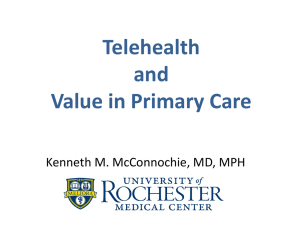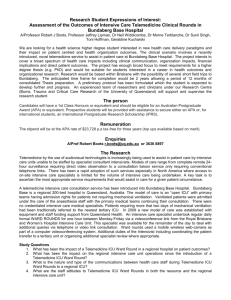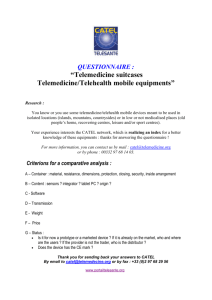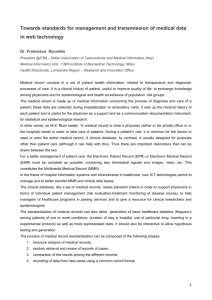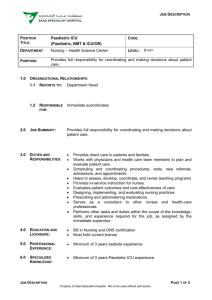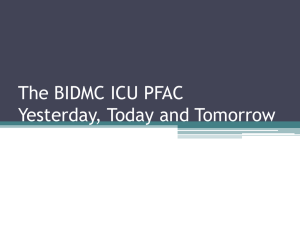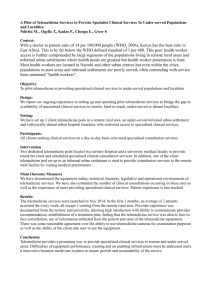liaison report - Get Involved - American Association of Critical
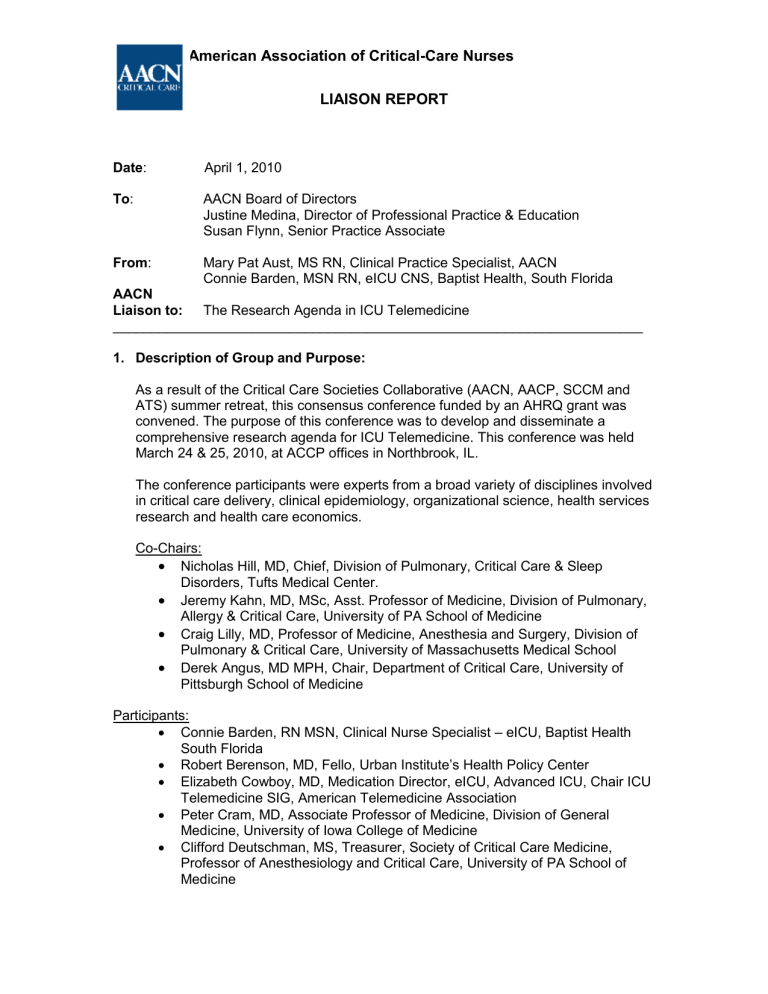
American Association of Critical-Care Nurses
LIAISON REPORT
Date : April 1, 2010
To : AACN Board of Directors
Justine Medina, Director of Professional Practice & Education
From :
Susan Flynn, Senior Practice Associate
Mary Pat Aust, MS RN, Clinical Practice Specialist, AACN
Connie Barden, MSN RN, eICU CNS, Baptist Health, South Florida
AACN
Liaison to: The Research Agenda in ICU Telemedicine
_____________________________________________________________________
1. Description of Group and Purpose:
As a result of the Critical Care Societies Collaborative (AACN, AACP, SCCM and
ATS) summer retreat, this consensus conference funded by an AHRQ grant was convened. The purpose of this conference was to develop and disseminate a comprehensive research agenda for ICU Telemedicine. This conference was held
March 24 & 25, 2010, at ACCP offices in Northbrook, IL.
The conference participants were experts from a broad variety of disciplines involved in critical care delivery, clinical epidemiology, organizational science, health services research and health care economics.
Co-Chairs:
Nicholas Hill, MD, Chief, Division of Pulmonary, Critical Care & Sleep
Disorders, Tufts Medical Center.
Jeremy Kahn, MD, MSc, Asst. Professor of Medicine, Division of Pulmonary,
Allergy & Critical Care, University of PA School of Medicine
Craig Lilly, MD, Professor of Medicine, Anesthesia and Surgery, Division of
Pulmonary & Critical Care, University of Massachusetts Medical School
Derek Angus, MD MPH, Chair, Department of Critical Care, University of
Pittsburgh School of Medicine
Participants:
Connie Barden, RN MSN, Clinical Nurse Specialist – eICU, Baptist Health
South Florida
Robert Berenson, MD, Fello, Urban Institute’s Health Policy Center
Elizabeth Cowboy, MD, Medication Director, eICU, Advanced ICU, Chair ICU
Telemedicine SIG, American Telemedicine Association
Peter Cram, MD, Associate Professor of Medicine, Division of General
Medicine, University of Iowa College of Medicine
Clifford Deutschman, MS, Treasurer, Society of Critical Care Medicine,
Professor of Anesthesiology and Critical Care, University of PA School of
Medicine
American Association of Critical-Care Nurses
Liaison Report
2
Dee Ford, MD Assistant Professor, Division of Pulmonary, Critical Care,
Allergy and Sleep, Medical University of South Carolina
Victoria Freeman, Lead Investigator, North Carolina Rural Health Research and Policy Analysis Center, University of North Carolina at Chapel Hill
Jack Iwashyna, MD, PhD, Assistant Professor of Medicine and Health Policy,
Division of Pulmonary and Critical Care, University of Michigan School of
Medicine
Judi Jacobi, PharmD, BCPS President, Society of Critical Care Medicine,
Critical Care Pharmacy Specialist, Clarian Health
Ruth M. Kleinpell, RN PhD, Professor of Nursing, Rush University College of
Nursing
Benjamin Kohl, MD Assistant professor of Anesthesia and Critical Care,
University of Pennsylvania
Deanna Larson, RN Vice President, Nursing & Quality Integration, Avera
Health, Sioux Falls, SD
David Longnecker, MD Director, Health Care Affairs, American Association of
Medical Colleges
James P. Marcin, MD MPH Associate Professor, Department of Pediatrics,
Center for Health Services Research, University of California, Davis
James Mathers, MD Partner, Pulmonary Associates of Richmond, Immediate
Past ‐ President, American College of Chest Physicians
Justine Medina, RN MS Director, Professional Practice and Programs,
American Association of Critical Care Nurses
Bela Patel, MD Associate Professor of Medicine, Memorial Hermann ‐ Texas
Medical Center, University of Texas Medical School at Houston
Dena Puskin, ScD Director, Office for the Advancement of Telehealth, Health
Resources and Services Administration
Marta Render, MD Professor of Medicine, University of Cincinnati, Director,
VA Getting at Patient Safety Center
Selwyn Rogers, MD MPH Chief of Burn, Trauma and Surgical Critical Care,
Center for Surgery and Public Health, Brigham and Women’s Hospital
Jeffrey Rothschild, MD MPH, Division of General Internal Medicine, Brigham
& Women’s Hospital, Harvard Medical School
Gordon D. Rubenfeld, MD MSc, Professor and Chief, Program in Trauma,
Emergency and Critical Care, Sunnybrook Health Sciences Centre
Anne Sales, RN PhD, Associate Professor, Research Chair in
Interdisciplinary Health Teams, University of Alberta School of Nursing
Damon Scales, MD PhD Assistant Professor, Department of Critical Care,
University of Toronto
J. Bryan Sexton, PhD MA Director of Patient Safety, Research and Training,
Duke University Health System
2. Meeting Discussion and Outcomes:
An iterative consensus process was used to critically examine the state of the science underlying ICU telemedicine, identify important knowledge gaps in ICU telemedicine with the context of current ICU services, and assess the scientific and
American Association of Critical-Care Nurses
Liaison Report
3 methodological approaches necessary to fill these knowledge gaps, and outline and prioritize a specific program of effectiveness and implementation research.
The meeting began with sessions on the state of the science of telemedicine in the
ICU and an update on the current research. These were followed by small group breakout sessions to focus on specific topics for evaluation and recommendation.
Each small group breakout session was followed by a reporting to the entire conference in a plenary session to further refine the findings. The question each small group was asked to consider is: What would you want to know about telemedicine in the ICU in 30 years? The small group topics were:
Clinical outcomes: Identification and prioritization of key clinical outcomes that may be impacted by ICU telemedicine (i.e. survival, health related quality of life, etc.); research relating to the effects of ICU telemedicine on these outcomes of health care; potential modifiers of the effectiveness of ICU telemedicine in this domain.
Process of care: Identification and prioritization of key clinical processes that may be impacted by ICU telemedicine (i.e. bundle implementation, evidence-based practices, earlier recognition and response to physiological instability, workstation assisted care plan review at the time of admission, etc.); research relating to the effects of ICU telemedicine on these health care processes and; potential modifiers of the effectiveness of ICU telemedicine in this domain.
Patient safety: Identification and prioritization of key patient safety indicators that may be impacted by ICU telemedicine (i.e. medical errors, ICU-acquired complications, etc.) research relating to the effects of ICU telemedicine on patient safety; potential modifiers of the effectiveness of ICU telemedicine in this domain; identification of methods for quantifying the impact of measures of patient safety factors on outcomes.
Cost and cost-effectiveness: Research relating to the effects of ICU telemedicine on the costs of health care; strategies for reducing health costs through telemedicine; the financial impact of caring for higher acuity cases in community hospitals rather than tertiary referral centers; financial barriers to telemedicine adoption; billing and reimbursement for telemedicine services.
Organizational climate: Research into the effects of ICU telemedicine on organizational climate in the ICU, including teamwork, communication and interdisciplinary care; ways in which organizational climate can influence telemedicine effectiveness; organizational and cultural barriers to telemedicine adoption; research regarding the relation of organizational structure to telemedicine effects on outcome.
Medical education and research: Research into the role of telemedicine in undergraduate, graduate and continuing medical and nursing education; effects of telemedicine on off-hours access to education; impact on educational quality, and trainee supervision.
The output from the small group and plenary sessions will be reviewed and synthesized by the writing committee. Once completed, a document will be sent to
American Association of Critical-Care Nurses
Liaison Report all conference attendees for review and ultimately made available for publication journals and dissemination to key stakeholders.
3. Implications for AACN:
Once the review copies of the document are released, we will have to ensure that some of the discussions related to critical care nurses influence and involvement in these topical areas were captured. AACN will want to consider this work for inclusion in AACN’s research agenda.
The discussions from this meeting will help inform some of the work of the Tele-ICU
Task force.
The work of Dr. Bryan Sexton from the Duke Patient Safety Center, around, patient safety, teamwork, nursing resilience and nurses “finding their voice” is very complimentary to the Healthy Work Environment work. I believe we would benefit from have further discussions with him to see if there are any opportunities to collaborate.
4. Future Meetings:
This is the only meeting for this group.
4
